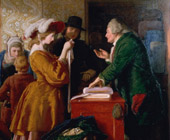 Some believe that a simple solution to all our economic problems is to unfetter markets and everything will enter into order. Take away visible restraints and invisible hands will work their magic.
Some believe that a simple solution to all our economic problems is to unfetter markets and everything will enter into order. Take away visible restraints and invisible hands will work their magic.
The problem with such an outlook is that it has proven illusive. There have been relatively free sectors of modern economy. However, problems always seem to appear that threaten truly free markets. Crony capitalism shows up on the scene. Monopolies and cartels end up controlling markets. Speculative bubbles form, panics take hold and stock market crashes bring the whole system down.
In response to abuses, government intervenes with regulations and socialistic legislation. Bureaucracies are formed. Worse yet, big business works in cahoots with big government to write the new rules of the market that confirm their dominance and stifle competition by creating unleveled playing fields.
There is an irony to all of this. If the free market is among the best and most natural of all systems (and I believe it is), it should have triumphed over all these obstacles. It should have built-in mechanisms that prevent these problems from appearing in the first place. We are faced with the uncomfortable conclusion that the free market cannot compete on the free market. It always falls victim to corrupt politicians, crony capitalists and unscrupulous dealers who ruin the playing field and invite government intervention. It is as if a mysterious serpent enters into the free market paradise and ruins everything.
To resolve the problem, we must not confuse the paradise with the serpent. The free market is not causing all the trouble. As a system, it works just fine. Much of the prosperity we have today can be attributed to the remnants of free markets that survive or even thrive. The problem is the serpent not the paradise.
There is indeed the presence of a serpent that lurks in free markets that can be traced in our modern economy especially from the Industrial Revolution onward. In my recent book, Return to Order: From a Frenzied Economy to an Organic Christian Society, I describe this serpent that can be seen an unbalanced drive inside modern economy which I call “frenetic intemperance.” Frenetic intemperance is a reckless and restless spirit inside certain sectors of modern economy that leads us to throw off legitimate restraints, and gratify all desires. It creates an economy that is frenzied and a culture of instant gratification.
Frenetic intemperance is not about greed or ordinary ambition. These have always existed and the free market can deal with them. It is not about ordinary business drive and risk-taking. This is a much needed element of industry. No, frenetic intemperance is something that leads people to resent the very idea of restraint and scorn the spiritual, religious, moral and cultural values that normally serve to order and temper economic activity.
Frenetic intemperance can be seen in frenzied markets, newfangled investment instruments and high-risk derivatives found all over the world of finance. It can be seen in speculative bubbles like the 2008 sub prime mortgage crisis. It is an almost irrational factor that often sets the tone for the business world and ends up destroying free markets.
Frenetic intemperance also has a consumer side that can be seen in daily lives with our frenzied lifestyles. Our schedules are rushed and hectic. Instant gratification is the order of the day. We must have everything now, instantly, regardless of the consequences. Consumers are encouraged spend well beyond their means with the click of a mouse or the swipe of a card.
The worst thing is that people have the mistaken idea that the “free” in free market means this wheeling and dealing, reckless spirit of frenetic intemperance that fuels speculation and leveraging, creates bubbles and crashes markets. They think “free” markets mean freeing the serpent. They fail to realize that by freeing the serpent, we fetter truly free markets.
Edmund Burke once said: “Intemperate men cannot be free, they forge their own fetters.”
His words underscore the reality that any human system can only be in order when the human element that constitutes it is in order. Free markets can only be free when men are free from the tyranny of their passions. This requires fiscal discipline, arduous effort and virtue.
If this is done, the free market not only can compete on the free market but it will produce fabulous results since men will then act according to their nature. We will not have paradise since fallen man constantly conspires against it. However, there will certainly be fewer snakes lurking about to invite great crashes and catastrophes.
 By freeing the serpent, frenetic intemperance ends up fettering the free market. We could say that the real key to freeing the markets is to fetter the serpent.
By freeing the serpent, frenetic intemperance ends up fettering the free market. We could say that the real key to freeing the markets is to fetter the serpent.


